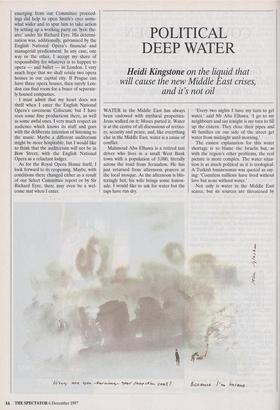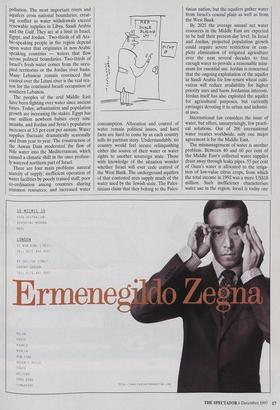POLITICAL DEEP WATER
Heidi Kingstone on the liquid that will cause the new Middle East crises, and it's not oil WATER in the Middle East has always been endowed with mythical properties: Jesus walked on it; Moses parted it. Water is at the centre of all discussions of territo- ry, security and peace, and, like everything else in the Middle East, water is a cause of conflict.
Mahmoud Abu Elhawa is a retired taxi driver who lives in a small West Bank town with a population of 3,000, literally across the road from Jerusalem. He has just returned from afternoon prayers at the local mosque. As the afternoon is blis- teringly hot, his wife brings some lemon- ade. I would like to ask for water but the taps have run dry. `Every two nights I have my turn to get water,' said Mr Abu Elhawa. 'I go to my neighbours and say tonight is my turn to fill up the cistern. They close their pipes and 40 families on our side of the street get water from midnight until morning.'
The easiest explanation for this water shortage is to blame the Israelis but, as with the region's other problems, the real picture is more complex. The water situa- tion is as much political as it is ecological. A Turkish businessman was quoted as say- ing: 'Countless millions have lived without love but none without water.'
Not only is water in the Middle East scarce, but its sources are threatened by pollution. The most important rivers and aquifers cross national boundaries, creat- ing conflict as water withdrawals exceed renewable supplies in Libya, Saudi Arabia and the Gulf. They are at a limit in Israel, Egypt, and Jordan. Two-thirds of all Ara- bic-speaking people in the region depend upon water that originates in non-Arabic speaking countries — waters that flow across political boundaries. Two-thirds of Israel's fresh water comes from the occu- pied territories or the Jordan river basin. Many Lebanese remain convinced that control over the Litani river is the real rea- son for the continued Israeli occupation of southern Lebanon.
The peoples of the arid Middle East have been fighting over water since ancient times. Today, urbanisation and population growth are increasing the stakes. Egypt has one million newborn babies every nine months, and Jordan and Syria's population increases at 3.5 per cent per annum. Water supplies fluctuate dramatically seasonally and from year to year. The construction of the Aswan Dam moderated the flow of Nile water into the Mediterranean, which caused a climatic shift in the once profuse- ly watered northern part of Israel. There are four main problems: natural scarcity of supply; inefficient operation of water facilities by poorly trained staff; poor co-ordination among countries sharing common resources; and increased water consumption. Allocation and control of water remain political issues, and hard facts are hard to come by as each country tells its partisan story. Understandably, no country would feel secure relinquishing either the source of their water or water rights to another sovereign state. Those with knowledge of the situation wonder whether Israel will ever cede control of the West Bank. The underground aquifers of that contested area supply much of the water used by the Jewish state. The Pales- tinians claim that they belong to the Pales- tinian nation, but the aquifers gather water from Israel's coastal plain as well as from the West Bank.
By 2025 the average annual net water resources in the Middle East are expected to be half their present-day level. In Israel and Jordan, projected population growth could require severe restriction or com- plete elimination of irrigated agriculture over the next several decades to free enough water to provide a reasonable mini- mum for essential use. Jordan is concerned that the ongoing exploitation of the aquifer in Saudi Arabia for low-return wheat culti- vation will reduce availability for higher priority uses and harm Jordanian interests. Jordan itself has also exploited the aquifer for agricultural purposes, but currently envisages devoting it to urban and industri- al uses.
International law considers the issue of water, but offers, unsurprisingly, few practi- cal solutions. Out of 286 international water treaties worldwide, only one major agreement is for the Middle East.
The mismanagement of water is another problem. Between 40 and 60 per cent of the Middle East's collected water supplies drain away through leaky pipes. 55 per cent of Gaza's water is allocated to the irriga- tion of low-value citrus crops, from which the total income in 1992 was a mere US$18 million. Such inefficiency characterises water use in the region. Israel is today one of the most technologically driven coun- tries in the world, yet in 1989 its agricul- ture consumed 68.5 per cent of the available water supply, and in 1991 con- tributed only 3.1 per cent to the net domestic product and employed only 4.1 per cent of the labour force.
But Israel is taking action. Although it currently uses three times as much water as its Palestinian neighbours, it has begun to move towards less water-consuming crops and has developed very intensive agriculture. Palestinians claim they are the victim of the Israeli measures. They say that the Israeli law which prohibits the drilling of new wells without permission from the military authorities has virtually frozen their urban and industrial growth.
Although there is no one obvious solu- tion to the problem, several are talked about, including the desalinisation of sea water, importing fresh water by land or sea and the re-use of waste water. If any of these are to have a chance of success, Mid- dle Eastern nations must learn to co-ordi- nate their efforts. They must also recognise that the risks are shared as well as the water: any kind of pollution in the highest coastal plain affects those along the water's flow. But attempts at co-opera- tion seem to evaporate as easily as the commodity they are intended to manage. Politics always intrudes: for Syria to have a water accord with Israel would imply Syria's official recognition of the state of Israel. 'This is the era of water geopolitics,' said a leading water expert. The level of mistrust is so deep that things easily deteri- orate into a contest of wills. As has been said often enough in the region, water is a commodity more valuable than oil, espe- cially as new oilfields are discovered around the world. In the Middle East the saying goes: the Iraqis have oil, we have water; let them drink their oil.




















































































 Previous page
Previous page